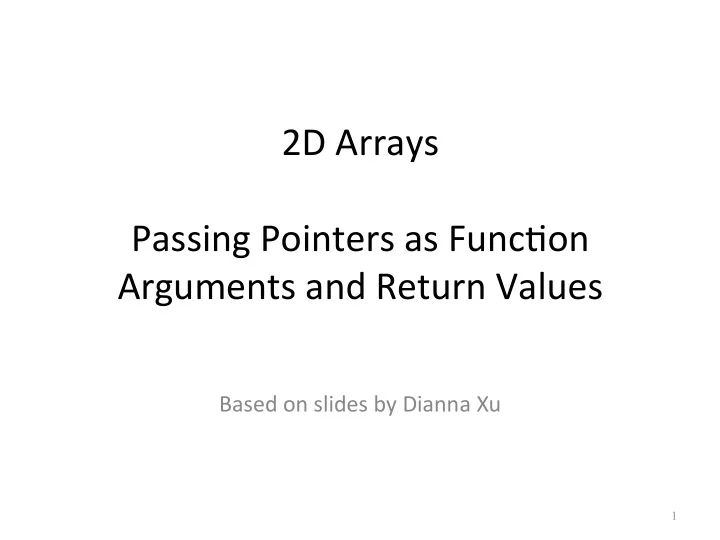

¡ 2D ¡Arrays ¡ ¡ Passing ¡Pointers ¡as ¡Func3on ¡ Arguments ¡and ¡Return ¡Values ¡ Based ¡on ¡slides ¡by ¡Dianna ¡Xu ¡ 1
Outline • Arrays in terms of pointers – Multi-dimensional – Pointer arrays • Pointers as function arguments • Pointers as function return value 2
Pointer Arrays: Pointer to Pointers • Pointers can be stored in arrays • Two-dimensional arrays are just arrays of pointers to arrays. – int a[10][20]; int *b[10]; – Declaration for b allows 10 int pointers, with no space allocated. – Each of them can point to an array of 20 integers – int c[20]; b[0] = c; – What is the type of b ? 3
2D ¡Arrays ¡ int ¡rows ¡= ¡10; ¡int ¡cols ¡= ¡10; ¡ ¡ int ¡b[rows][cols]; ¡ ¡ int** ¡a ¡= ¡new ¡int*[rows]; ¡ for(int ¡i ¡= ¡0; ¡i ¡< ¡rows; ¡++i) ¡ ¡a[i] ¡= ¡new ¡int[cols]; ¡ 4
Ragged Arrays 5
Ragged ¡2D ¡Arrays ¡ int ¡rows ¡= ¡10; ¡ ¡ int** ¡a ¡= ¡new ¡int*[rows]; ¡ for(int ¡i ¡= ¡0; ¡i ¡< ¡rows; ¡++i) ¡ ¡a[i] ¡= ¡new ¡int[i]; ¡ 6
Pointer Safety • After you deallocate the memory associated with a pointer, set it to NULL for safety • C++11 includes the nullptr keyword for a null pointer int* p = new int[50]; ... delete[] p; p = nullptr; • While setting the pointer to 0 works, this isn’t type-safe 7
Pointers are Passed by Value to Functions • A copy of the pointer ’ s value is made – the address stored in the pointer variable • The copy is then a pointer pointing to the same object as the original parameter • Thus modifications via de-referencing the copy STAYS. 8
Function Arguments • x and y are copies of the original, and thus a and b can not be altered. void swap(int x, int y) { int tmp; tmp = x; x = y; y = tmp; } Wrong! Could use int main() { int a = 1, b = 2; pass-by-reference, but let’s use pointers! swap(a, b); return 0; } 9
Recall: Pass by Reference // pass-by-reference (pass a reference to the argument) int f(int& a) { a = a+1; return a; } a: int main() { int xx = 0; f(xx); // f() changed the value of xx cout << xx << endl; // writes 1 } xx: 0 Really, you should only use pass-by-const-reference: void g(int a, int& r, const int& cr) { ++a; ++r; int x = cr; ++x; } int main() { int x = 0, y = 0, z = 0; g(x,y,z); // x==0; y==1; z==0 } // const references are very useful for passing large objects 10
Pointers and Function Arguments • Passing pointers – a and b are passed by pointers (the pointers themselves px and py are still passed by value) void swap(int *px, int *py) { px int tmp; tmp = *px; *px = *py; *py = tmp; py } int main() { int a = 1, b = 2; 1 a swap(&a, &b); return 0; 2 b } 11
Use Pointers to Modify Multiple Values in a Function void decompose(double d, int *i, double *frac) { *i = (int) d; *frac = d - *i; } int main() { int int_part; double frac_part, input; scanf("%lf", &input); decompose(input, &int_part, &frac_part); printf("%f decomposes to %d and %f\n", *int_part, *frac_part); return 0; } 12
Pass by Reference • Do not equate pass-by-reference with pass- by-pointer • The pointer variables themselves are still passed by value • The objects being pointed to, however, are passed by reference • In a function, if a pointer argument is de- referenced, then the modification indirectly through the pointer will stay 13
Modification of a Pointer void g(int **ppx, int *py) { *ppx = py; } int main() { int x = 1, y = 2, *px; px = &x; g(&px, &y); printf("%d", *px); // will print 2 } 14
Pointer as Return Value • We can also write functions that return a pointer • Thus, the function is returning the memory address of where the value is stored instead of the value itself • Be very careful not to return an address to a temporary variable in a function!!! 15
Example of Returning a Pointer int* max(int *x, int *y) { if (*x > *y) return x; return y; } int main() { int a = 1, b = 2, *p; p = max(&a, &b); return 0; } 16
Example of Returning a Pointer • How do these two code samples compare? – Hint: x and y are copies of the original, so what are &x and &y ? int* max(int *x, int *y) { int* max(int x, int y) { if (*x > *y) if (x > y) return x; return &x; return y; return &y; } } int main() { int a = 1, b = 2, *p; p = max(&a, &b); p = max(a, b); return 0; } 17
Arrays as Arguments • Arrays are passed #define SIZE 10 by reference void init(int a[]) { int i; • Modifications stay for(i = 0;i<SIZE;i++){ a[i] = 0; } } /* equivalent pointer alternative */ void init(int *a) { int main() { int i; int a[SIZE]; for(i = 0;i<SIZE;i++){ init(a); *(a+i) = 0; return 0; } } } 18
Pointer Arithmetic: Combining * and ++/-- • ++ and -- has precedence over * – a[i++] = j; – p=a; *p++ = j; <==> *(p++) = j; – *p++; value: *p, inc: p – (*p)++; value: *p, inc: *p – ++(*p); value: (*p)+1, inc: *p – *++p; value: *(p+1), inc: p 19
Recommend
More recommend